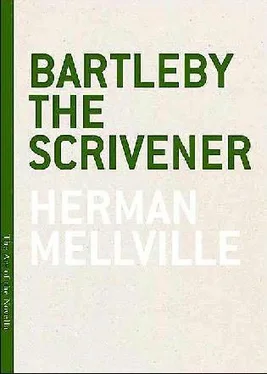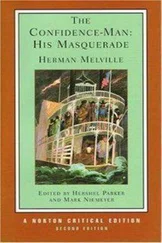As days passed on, I became considerably reconciled to Bartleby. His steadiness, his freedom from all dissipation, his incessant industry (except when he chose to throw himself into a standing revery behind his screen), his great, stillness, his unalterableness of demeanor under all circumstances, made him a valuable acquisition. One prime thing was this, — _he was always there;_-first in the morning, continually through the day, and the last at night. I had a singular confidence in his honesty. I felt my most precious papers perfectly safe in his hands. Sometimes to be sure I could not, for the very soul of me, avoid falling into sudden spasmodic passions with him. For it was exceeding difficult to bear in mind all the time those strange peculiarities, privileges, and unheard of exemptions, forming the tacit stipulations on Bartleby's part under which he remained in my office. Now and then, in the eagerness of dispatching pressing business, I would inadvertently summon Bartleby, in a short, rapid tone, to put his finger, say, on the incipient tie of a bit of red tape with which I was about compressing some papers. Of course, from behind the screen the usual answer, "I prefer not to," was sure to come; and then, how could a human creature with the common infirmities of our nature, refrain from bitterly exclaiming upon such perverseness-such unreasonableness. However, every added repulse of this sort which I received only tended to lessen the probability of my repeating the inadvertence.
Here it must be said, that according to the custom of most legal gentlemen occupying chambers in densely-populated law buildings, there were several keys to my door. One was kept by a woman residing in the attic, which person weekly scrubbed and daily swept and dusted my apartments. Another was kept by Turkey for convenience sake. The third I sometimes carried in my own pocket. The fourth I knew not who had.
Now, one Sunday morning I happened to go to Trinity Church, to hear a celebrated preacher, and finding myself rather early on the ground, I thought I would walk around to my chambers for a while. Luckily I had my key with me; but upon applying it to the lock, I found it resisted by something inserted from the inside. Quite surprised, I called out; when to my consternation a key was turned from within; and thrusting his lean visage at me, and holding the door ajar, the apparition of Bartleby appeared, in his shirt sleeves, and otherwise in a strangely tattered dishabille, saying quietly that he was sorry, but he was deeply engaged just then, and-preferred not admitting me at present. In a brief word or two, he moreover added, that perhaps I had better walk round the block two or three times, and by that time he would probably have concluded his affairs.
Now, the utterly unsurmised appearance of Bartleby, tenanting my law-chambers of a Sunday morning, with his cadaverously gentlemanly _nonchalance_, yet withal firm and self-possessed, had such a strange effect upon me, that incontinently I slunk away from my own door, and did as desired. But not without sundry twinges of impotent rebellion against the mild effrontery of this unaccountable scrivener. Indeed, it was his wonderful mildness chiefly, which not only disarmed me, but unmanned me, as it were. For I consider that one, for the time, is a sort of unmanned when he tranquilly permits his hired clerk to dictate to him, and order him away from his own premises. Furthermore, I was full of uneasiness as to what Bartleby could possibly be doing in my office in his shirt sleeves, and in an otherwise dismantled condition of a Sunday morning. Was any thing amiss going on? Nay, that was out of the question. It was not to be thought of for a moment that Bartleby was an immoral person. But what could he be doing there? — copying? Nay again, whatever might be his eccentricities, Bartleby was an eminently decorous person. He would be the last man to sit down to his desk in any state approaching to nudity. Besides, it was Sunday; and there was something about Bartleby that forbade the supposition that he would by any secular occupation violate the proprieties of the day.
Nevertheless, my mind was not pacified; and full of a restless curiosity, at last I returned to the door. Without hindrance I inserted my key, opened it, and entered. Bartleby was not to be seen. I looked round anxiously, peeped behind his screen; but it was very plain that he was gone. Upon more closely examining the place, I surmised that for an indefinite period Bartleby must have ate, dressed, and slept in my office, and that too without plate, mirror, or bed. The cushioned seat of a rickety old sofa in one corner bore the faint impress of a lean, reclining form. Rolled away under his desk, I found a blanket; under the empty grate, a blacking box and brush; on a chair, a tin basin, with soap and a ragged towel; in a newspaper a few crumbs of ginger-nuts and a morsel of cheese. Yes, thought I, it is evident enough that Bartleby has been making his home here, keeping bachelor's hall all by himself. Immediately then the thought came sweeping across me, What miserable friendlessness and loneliness are here revealed! His poverty is great; but his solitude, how horrible! Think of it. Of a Sunday, Wall-street is deserted as Petra; and every night of every day it is an emptiness. This building too, which of week-days hums with industry and life, at nightfall echoes with sheer vacancy, and all through Sunday is forlorn. And here Bartleby makes his home; sole spectator of a solitude which he has seen all populous-a sort of innocent and transformed Marius brooding among the ruins of Carthage!
For the first time in my life a feeling of overpowering stinging melancholy seized me. Before, I had never experienced aught but a not-unpleasing sadness. The bond of a common humanity now drew me irresistibly to gloom. A fraternal melancholy! For both I and Bartleby were sons of Adam. I remembered the bright silks and sparkling faces I had seen that day, in gala trim, swan-like sailing down the Mississippi of Broadway; and I contrasted them with the pallid copyist, and thought to myself, Ah, happiness courts the light, so we deem the world is gay; but misery hides aloof, so we deem that misery there is none. These sad fancyings-chimeras, doubtless, of a sick and silly brain-led on to other and more special thoughts, concerning the eccentricities of Bartleby. Presentiments of strange discoveries hovered round me. The scrivener's pale form appeared to me laid out, among uncaring strangers, in its shivering winding sheet.
Suddenly I was attracted by Bartleby's closed desk, the key in open sight left in the lock.
I mean no mischief, seek the gratification of no heartless curiosity, thought I; besides, the desk is mine, and its contents too, so I will make bold to look within. Every thing was methodically arranged, the papers smoothly placed. The pigeon holes were deep, and removing the files of documents, I groped into their recesses. Presently I felt something there, and dragged it out. It was an old bandanna handkerchief, heavy and knotted. I opened it, and saw it was a savings' bank.
I now recalled all the quiet mysteries which I had noted in the man. I remembered that he never spoke but to answer; that though at intervals he had considerable time to himself, yet I had never seen him reading-no, not even a newspaper; that for long periods he would stand looking out, at his pale window behind the screen, upon the dead brick wall; I was quite sure he never visited any refectory or eating house; while his pale face clearly indicated that he never drank beer like Turkey, or tea and coffee even, like other men; that he never went any where in particular that I could learn; never went out for a walk, unless indeed that was the case at present; that he had declined telling who he was, or whence he came, or whether he had any relatives in the world; that though so thin and pale, he never complained of ill health. And more than all, I remembered a certain unconscious air of pallid-how shall I call it? — of pallid haughtiness, say, or rather an austere reserve about him, which had positively awed me into my tame compliance with his eccentricities, when I had feared to ask him to do the slightest incidental thing for me, even though I might know, from his long-continued motionlessness, that behind his screen he must be standing in one of those dead-wall reveries of his.
Читать дальше












